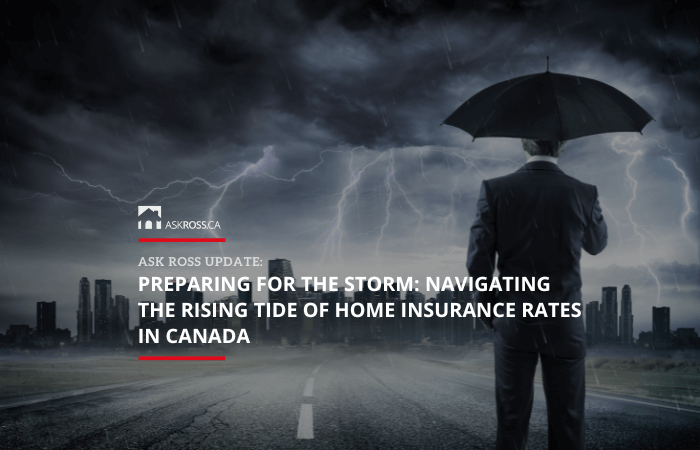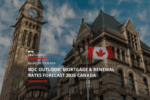
Published: April 1st, 2024 • Last Updated: April 18th, 2024
Author: Brent Rowe on AskRoss.ca
Canadians are being urged to brace themselves for higher home insurance rates in the coming year, as a confluence of factors including inflation and climate-related disasters threatens to reshape the insurance landscape. A recent report from insurance comparison website MyChoice warns of a “significant shift” in insurance costs, driven by mounting pressures from escalating repair and replacement expenses and the increasing frequency and severity of climate-related events.

Key Points
Home insurance prices surged by 7.66% year-over-year in January, signalling a notable uptick in insurance costs that is likely to persist in the near future. Despite expectations of inflation leveling off by 2025, the persistent impact of high repair and replacement costs, compounded by climate change-induced disasters such as wildfires and floods, continues to drive insurance rates upward.
The Influence of Climate Change
The report underscores the undeniable influence of climate change on the frequency and severity of natural disasters in Canada, which has become a critical factor in the escalating risk landscape for insurers. Severe weather conditions in 2023 alone caused over $3.1 billion in insured damage across the country, highlighting the urgent need for insurers to recalibrate rates to mitigate growing risks.
Regional Disparities
Certain provinces, such as British Columbia, Ontario, and Quebec, have experienced higher insured damages, contributing to the broader trend of increasing insurance rates. The heightened risk and cost of claims associated with these events necessitate adjustments in insurance pricing to reflect the evolving risk landscape.
Government Initiatives
To address the rise in insurance premiums and combat the socio-economic impact of floods, the federal government allocated $31.7 million toward the national flood insurance program in its 2023 budget. While such initiatives aim to alleviate financial burdens for homeowners, challenges persist amidst high mortgages and a rising cost of living, which may exacerbate mortgage delinquency rates.

The Takeaway
As Canadians navigate the evolving landscape of home insurance, proactive measures and government interventions are essential to mitigate the financial impact of rising insurance rates. With climate change exerting increasing pressure on insurers and homeowners alike, collaborative efforts to enhance resilience and affordability in the insurance market are paramount. By addressing the root causes of insurance rate increases and bolstering support mechanisms for affected homeowners, Canada can navigate the challenges ahead and build a more resilient housing ecosystem for the future.
Mississauga News

What Will Happen to My Mortgage Payments When My Low Rate Expires?

10 Smart Ways to Manage Higher Mortgage Payments in 2026

Is 2026 a Good Time to Buy a Home in Toronto?

How Canadians Can Use Second Mortgages to Crush Debt in 2026

BoC Outlook: Mortgage & Renewal Rates Forecast 2026 Canada
Have questions? Let’s connect.
Get quick answers to your questions, no matter how difficult – 7 days a week.
[thrive_leads id=’21617′]
 Apply For a Mortgage
Apply For a Mortgage